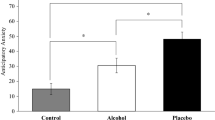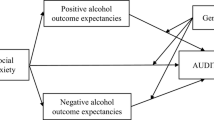Abstract
We examined the hypothesis that social anxiety and alcohol outcome expectancies interact in relating to the quantity and frequency of alcohol consumption. Two hundred twenty-nine undergraduates completed self-report questionnaires. The results showed situational specificity of alcohol expectancies. Expecting that alcohol would reduce anxiety in social situations moderated the relation between social anxiety and alcohol consumption; no such moderating effect was found for expectancy of general tension reduction. Among those who did not expect alcohol to reduce their anxiety in social situations, high-social-anxiety participants reported lower frequency and quantity of alcohol consumption than did low-social-anxiety individuals. High- and low-social-anxiety participants who expected alcohol to reduce their social anxiety did not differ in their alcohol consumption.
Similar content being viewed by others
REFERENCES
Abrams, D. B., & Niaura, R. S. (1987). Social learning theory. In H. T. Blane & K. E. Leonard (Eds.), Psychological theories of drinking and alcoholism (pp. 131–178). New York: Guilford Press.
Aiken, L. S., & West, S. G. (1991). Multiple regression: Testing and interpreting interactions. Newbury Park, CA: Sage.
Brizer, D. A. (1993). Religiosity and drug abuse among psychiatric inpatients. American Journal of Drug and Alcohol Abuse, 19, 337–345.
Brown, S. A. (1985a). Expectancies versus background in the prediction of college drinking practices. Journal of Consulting and Clinical Psychology, 53, 123–130.
Brown, S. A. (1985b). Reinforcement expectancies and alcoholism treatment outcome after a one-year follow-up. Journal of Studies on Alcohol, 46, 304–308.
Brown, S. A., Christiansen, B. A., & Goldman, M. S. (1987). The Alcohol Expectancy Questionnaire: An instrument for the assessment of adolescent and adult alcohol expectancies. Journal of Studies on Alcohol, 48, 483–491.
Brown, S. A., Goldman, M. S., & Christiansen, B. A. (1985). Do alcohol expectancies mediate drinking patterns of adults? Journal of Consulting and Clinical Psychology, 53, 512–519.
Brown, S. A., Goldman, M. S., Inn, A., & Anderson, L. R. (1980). Expectancies of reinforcement from alcohol: Their domain and relation to drinking patterns. Journal of Consulting and Clinical Psychology, 48, 419–426.
Bruch, M. A., Heimberg, R. G., Harvey, C., McCann, M., Mahone, M., & Slavkin, S. L. (1992). Shyness, alcohol expectancies, and alcohol use: Discovery of a suppressor effect. Journal of Research in Personality, 26, 137–149.
Chen, M., Grube, J. W., & Madden, P. A. (1994). Alcohol expectancies and adolescent drinking: Differential prediction of frequency, quantity, and intoxication. Addictive Behaviors, 19, 521–529.
Cohen, J., & Cohen, P. (1983). Applied multiple regression/correlation analyses for the behavioral sciences (2nd ed.). Hillsdale, NJ: Erlbaum.
Conger, J. J. (1956). Reinforcement theory and the dynamics of alcoholism. Quarterly Journal of Studies on Alcohol, 7, 296–305.
Connors, G. J., O'Farrell, T. J., Cutter, H. S. G., & Thompson, D. L. (1986). Alcohol expectancies among male alcoholics, problem drinkers, and non-problem drinkers. Alcoholism: Clinical and Experimental Research, 10, 667–671.
Cooper, M. L., Russell, M., & George, W. H. (1988). Coping, expectancies, and alcohol use: A test of social learning foundations. Journal of Abnormal Psychology, 97, 218–230.
Crowne, D. P., & Marlowe, D. (1960). A new scale of social desirability independent of psychopathology. Journal of Consulting Psychology, 24, 349–354.
Darrow, S. L., Russell, M., Cooper, M. L., & Mudar, P. (1992). Sociodemographic correlates of alcohol consumption among African-American and White women. Women and Health, 18, 35–51.
Davidson, J. R. T., Hughes, D. L., George, L. K., & Blazer, D. G. (1993). The epidemiology of social phobia: Findings from the Duke Epidemiological Catchment Area Study. Psychological Medicine, 23, 709–718.
Dermen, K. H., & Cooper, M. L. (1994). Sex-related alcohol expectancies among adolescents: II. Prediction of drinking in social and sexual situations. Psychology of Addictive Behaviors, 8, 161–168.
Engs, R. O., Hanson, D. J., Gliksman, L., & Smythe, C. (1990). Influence of religion and culture on drinking behaviors: A test of hypotheses between Canada and USA. British Journal of Addiction, 85, 1475–1482.
George, W. H., Frone, M. R., Cooper, M. L., Russell, M., Skinner, J. B., & Windle, M. (1995). A revised Alcohol Expectancy Questionnaire: Factor structure confirmation and invariance in a general population sample. Journal of Studies on Alcohol, 56, 177–185.
Goldman, M. S., Brown, S. A., & Christiansen, B. A. (1987). Expectancy theory: Thinking about drinking. In H. T. Blane & K. E. Leonard (Eds.), Psychological theories of drinking and alcoholism (pp. 181–226). New York: Guilford Press.
Gross, W. C. (1993). Gender and age differences in college students' alcohol consumption. Psychological Reports, 72, 211–216.
Heimberg, R. G., Mueller, G. P., Holt, C. S., Hope, D. A., & Liebowitz, M. R. (1992). Assessment of anxiety in social interaction and being observed by others: The Social Interaction Anxiety Scale and the Social Phobia Scale. Behavior Therapy, 23, 53–73.
Higgins, R. L., & Marlatt, G. A. (1975). Fear of interpersonal evaluation as a determinant of alcohol consumption in male drinkers. Journal of Abnormal Psychology, 84, 644–651.
Holle, C., Heimberg, R. G., Sweet, R. A., & Holt, C. S. (1995). Alcohol and caffeine use by social phobics: An initial inquiry into drinking patterns and behavior. Behaviour Research and Therapy, 33, 561–566.
Hollingshead, A. B. (1975). Four Factor Index of Social Status. Unpublished manuscript. (Available from A. B. Hollingshead, Department of Sociology, Yale University, P.O. Box 1965, New Haven, Connecticut 06520.)
Jessor, R., Donovan, J. E., & Costa, F. M. (1992). Health behavior questionnaire: High school form. Denver: Institute of Behavioral Science, University of Colorado.
Kushner, M. G., Sher, K. J., & Beitman, B. D. (1990). The relation between alcohol problems and the anxiety disorders. American Journal of Psychiatry, 147, 685–695.
Leigh, B. C. (1989). Attitudes and expectancies as predictors of drinking habits: A comparison of three scales. Journal of Studies on Alcohol, 50, 432–440.
Mattick, R. P., & Clarke, J. C. (1989). Development and validation of measures of social phobia, scrutiny fear, and social interaction anxiety. Unpublished manuscript.
Meng, X., Rosenthal, R., & Rubin, D. B. (1992). Comparing correlated correlation coefficients. Psychological Bulletin, 111, 172–174.
Mooney, D. K., Fromme, K., Kivlahan, D. R., & Marlatt, G. A. (1987). Correlates of alcohol consumption: Sex, age, and expectancies relate differentially to quantity and frequency. Addictive Behaviors, 12, 235–240.
O'Hare, T. M. (1990). Drinking in college: Consumption patterns, problems, sex differences and legal drinking ages. Journal of Studies on Alcohol, 51, 536–541.
Parker, D. A., & Harford, T. C. (1992). The epidemiology of alcohol consumption and dependence across occupations in the United States. Alcohol Health and Research World, 16, 97–105.
Reynolds, W. M. (1982). Development of reliable and valid short forms of the Marlowe-Crowne Social Desirability Scale. Journal of Clinical Psychology, 38, 119–125.
Robinette, R. L. (1991). The relationship between the Marlowe-Crowne Form C and the validity scales of the MMPI. Journal of Clinical Psychology, 47, 396–399.
Rohsenow, D. J. (1982). Social anxiety, daily moods, and alcohol use over time among heavy social drinking men. Addictive Behaviors, 7, 311–315.
Rohsenow, D. J. (1983). Drinking habits and expectancies about alcohol effects for self versus others. Journal of Consulting and Clinical Psychology, 51, 752–756.
Shiffman, S., Paty, J. A., Gnys, M., Kassel, J. A., & Hickcox, M. (1996). First lapses to smoking: Within-subjects analysis of real-time reports. Journal of Consulting and Clinical Psychology, 64, 366–379.
Smith, G. T., Goldman, M. S., Greenbaum, P. E., & Christiansen, B. A. (1995). Expectancy for social facilitation from drinking: The divergent paths of high-expectancy and low-expectancy adolescents. Journal of Abnormal Psychology, 104, 32–40.
Sobell, L. C., & Sobell, M. B. (1990). Self-report issues in alcohol abuse: State of the art and future directions. Behavioral Assessment, 12, 77–90.
Stacy, A. W., Widaman, K. F., & Marlatt, G. A. (1990). Expectancy models of alcohol use. Journal of Personality and Social Psychology, 58, 918–928.
Van Ameringen, M., Mancini, C., Styan, G., & Donison, D. (1991). Relationship of social phobia with other psychiatric illness. Journal of Affective Disorders, 21, 93–99.
Welte, J. W., & Russell, M. (1993). Influence of socially desirable responding in a study of stress and substance abuse. Alcoholism: Clinical and Experimental Research, 17, 758–761.
Author information
Authors and Affiliations
Rights and permissions
About this article
Cite this article
Tran, G.Q., Haaga, D.A.F. & Chambless, D.L. Expecting That Alcohol Use Will Reduce Social Anxiety Moderates the Relation Between Social Anxiety and Alcohol Consumption. Cognitive Therapy and Research 21, 535–553 (1997). https://doi.org/10.1023/A:1021857402164
Issue Date:
DOI: https://doi.org/10.1023/A:1021857402164




